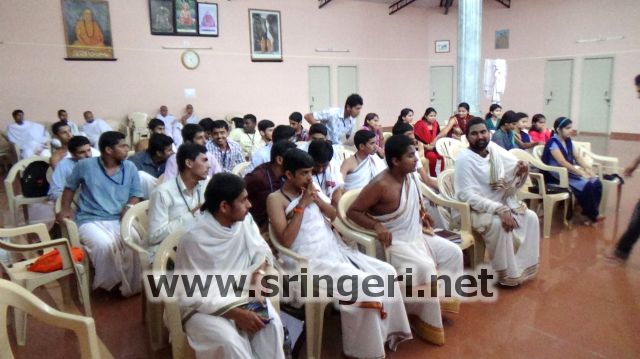Workshop on Indian History & Culture at Sringeri

The participants of History & Culture workshop
In the last weekend of July 2014 (26 and 27 July), a two day awareness workshop on the importance of studying the history and culture of India was organized by the Shankara Advaita Research Centre of Dakshinamnaya Sringeri Sri Sharada Peetham for the undergraduate students of Jagadguru Chandrashekhara Bharati Memorial college, Rajiv Gandhi Kendriya Samskrita Vidyapeetham, and the Sringeri Pathashala. As part of the workshfop, the participants understood and appreciated the greatness of Bharatiya Samskriti, the history and classification of scripts in the world and in India, the recording of Indian history in inscriptions (stone and copper plate) and in different kinds of manuscripts, the methods of inferring the period of the inscriptions and the importance of recording today’s events for posterity. At the end of the first day the students were blessed to have the Darshan of Jagadguru, listen to the Anugragha Bhashanam and receive Prasadam from the Lotus hands of the Jagadguru. In the Anugraha Bhashanam, Jagadguru mentioned that our ancestors followed the Dharma as prescribed in the Shastras. As Dharma is profound and exhaustive, they also penned many texts to expound Dharma. They taught the same to the further generations. It is important to note that they preached only what they practiced. For instance, engaging in charity is a great virtue. So when our ancestors engaged in the Dharma of giving charity, they also inspired others to do so. A lot of such charitable acts are recorded in inscriptions of historic importance. These inscriptions, called Daana-shaasanas, throw light on the details of the charitable acts. We come to know about the donor, the donee as well as the purpose or intention with which the charity was performed. A majority of these Daana-shaasanas have shlokas that convey morals related to charity –
स्वदत्तां परदत्तां वा यो हरेत वसुन्धराम् ।
षष्टिर्वर्षसहस्राणां विष्ठायां जायते कृमिः ॥
– He who usurps the land that has been donated here, or by others, will have to experience great suffering for thousands of years.
Similarly another shloka seen in the stone inscriptions is
न विषं विषमित्याहुः देवस्वं विषमुच्यते ।
विषमेकाकिनं हन्ति देवस्वं पुत्रपौत्रकम् ॥
– The real poison is not the one that we usually know – the one that can be easily procured from a store. The real poison is the usurping of the wealth and property of a temple. While poison only kills the one who consumes it, usurping the property of a temple effects even the children and grandchildren of the usurper.
So do the Shaasanas caution us to avoid misdeeds. Today, however, many fail to realize this and act contrarily. It is important to realize that our historical inscriptions explain to us Dharma in such matters. Then no sinful act would be engaged in by people today.
To understand and learn how our ancestors were following Dharma, we need to study these Shaasanas and Kadatas (the Kadatas are cloth manuscripts containing records, and available in many hundreds in the archives of the Peetham). To read these records, we need to have the knowledge of the scripts used in these records. This entire exercise will help us to follow our ancestors in leading a Dharmic life, and also inspire us to transmit the Dharmic way of life to our succeeding generations.
The Jagadguru said that it is in order to make the youth understand this aspect that such workshops are being organized by the Dakshinamnaya Sri Sharada Peetham. Senior scholars in this field, Prof. P N Narasimhamurthy and Sri A.K. Shastry popularly known as Kadata Shastry have willingly come forward to share their knowledge with the youth so that the importance of our Bharatiya Samskriti is understood and followed by the youth. The Jagadguru blessed one and all involved in the workshop.
